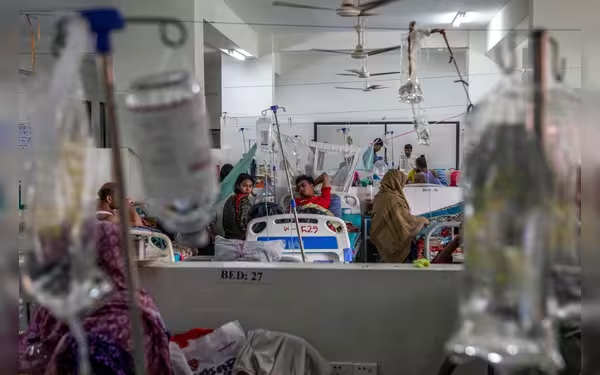Saturday, November 16, 2024 09:35 PM
Global Alarm Raised Over Ransomware Attacks on Hospitals
- WHO warns of rising ransomware threats to healthcare.
- Over 50 nations call for international cybersecurity cooperation.
- Russia and North Korea criticized for harboring cybercriminals.
 Image Credits: arabnewspk
Image Credits: arabnewspkWHO and 50 countries warn UN about rising ransomware attacks on hospitals, emphasizing urgent need for global cybersecurity cooperation.
The rise of ransomware attacks has become a pressing concern for nations around the globe, particularly in the healthcare sector. Recently, the World Health Organization (WHO) and approximately 50 countries raised alarms at the United Nations regarding the increasing frequency and severity of these cyberattacks targeting hospitals. Ransomware is a malicious software that hackers use to lock up important data, demanding a ransom to unlock it. This type of digital blackmail can have dire consequences, especially when it affects healthcare facilities that are crucial for saving lives.
During a meeting convened by the United States, WHO Director-General Tedros Adhanom Ghebreyesus emphasized the critical nature of these attacks, stating, "Such attacks on hospitals can be issues of life and death." He highlighted that the healthcare sector has seen a significant uptick in cyberattacks, which not only disrupt services but also pose serious risks to public safety. The WHO's call for international cooperation is vital, as these cybercrimes know no borders and require a united front to combat effectively.
A joint statement from over 50 nations, including South Korea, Ukraine, Japan, Argentina, France, Germany, and the United Kingdom, echoed these concerns. The statement warned that ransomware attacks threaten public safety, delay essential healthcare services, and can even jeopardize international peace and security. U.S. Deputy National Security Adviser Anne Neuberger shared this statement, underscoring the economic damage these attacks can inflict on nations.
Furthermore, the statement condemned countries that "knowingly" permit ransomware actors to operate from their territories. Neuberger specifically called out Russia, asserting that it continues to harbor these cybercriminals without facing consequences. France and South Korea also pointed fingers at North Korea for similar reasons. In response, Russia defended its position, arguing that the Security Council was not the right platform to discuss cybercrime, suggesting that the focus should instead be on other pressing issues, such as the attacks on hospitals in Gaza.
This ongoing situation highlights the urgent need for global collaboration in cybersecurity, particularly in protecting vital sectors like healthcare. As technology continues to evolve, so do the tactics of cybercriminals. It is crucial for nations to work together, share intelligence, and develop robust strategies to safeguard against these threats. The health and safety of individuals depend on the ability of governments to protect their healthcare systems from such malicious attacks. In a world increasingly reliant on digital infrastructure, the fight against ransomware is not just a technical challenge; it is a matter of life and death.













